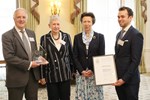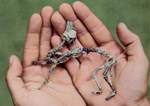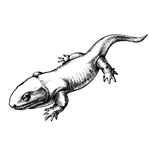Search - All Results
301 - 310 of 535 results
-
Scientists discover songbirds have an unusual chromosome
A new study, involving scientists from the Royal Veterinary College (RVC) in England and the Institute of Cytology and Genetics (ICG) in Russia, has found that all songbirds have an additional chromosome in their germ cells unlike other avian species.A new study, involving scientists from the Royal Veterinary College (RVC) in England and the …
-
RVC academic’s bovine TB test wins royal recognition
A bovine tuberculosis (TB) test co-created by Royal Veterinary College (RVC) academic Dr Ben Swift has won the Royal Dairy Innovation AwardA bovine tuberculosis (TB) test co-created by Royal Veterinary College (RVC) academic Dr Ben Swift …
-
Population of critically-endangered Saiga antelope doubles in past three years
International group, which includes the RVC, dedicated to Saiga conservation shows the population now numbers over 228,000 compared to around 103,000 in 2015.The population of the critically-endangered Saiga antelope in Central Asia has doubled during 2016 …
-
Bloomsbury Learning Environment to offer free Digital Skills Awareness course to HE institutions
Free Digital Skills Awareness course for higher education (HE) institutions to roll out to students before they start university. -
Recognising superheroes - New RVC awards for cat and dog blood donors
The RVC is celebrating these unsung heroes by awarding ‘Blood Donor of the Year’ awards to two of its regular donors, Bertie and Atticus -
RVC and The Animal and Plant Health Agency awarded OIE Collaborating Centre
OIE Collaborating Centres are centres of expertise in a specific designated sphere of competence relating to the management of general questions on animal health issues.The Royal Veterinary College (RVC) and the Animal and Plant Health Agency (APHA) have been jointly …
-
Early Jurassic dinosaur shifted from four legs to two legs as it grew up
Scientists have discovered that an early species of dinosaur, Mussaurus patagonicus, could only move on four limbs once born but switched to two legs as it grew up, just as humans do. -
New study explains how fish got their fingers
New analysis of anatomical evidence shows how the limbs of land vertebrates (such as mammals and reptiles) originated from the fins of water-bound fishes. -
Three Innovation Fellows appointed to lead research on infectious diseases
Three Innovation Fellows have been appointed, including two at the RVC, to undertake studies aimed at producing new diagnostic tools for infectious diseases. -
RVC PhD student co-authors research briefing for parliament
Fourth year student Alana Dowling has co-authored a research briefing for Parliamentarians as part of her three month science policy internship at the Parliamentary Office of Science & TechnologyFourth year PhD student Alana Dowling has co-authored a research briefing for Parliamentarians as …










